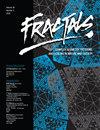FRACTAL DIMENSIONS OF SETS DEFINED BY DIGIT RESTRICTIONS IN ℝ2
IF 2.9
3区 数学
Q1 MATHEMATICS, INTERDISCIPLINARY APPLICATIONS
Fractals-Complex Geometry Patterns and Scaling in Nature and Society
Pub Date : 2023-07-29
DOI:10.1142/s0218348x23500743
引用次数: 0
Abstract
We introduce a class of sets defined by digit restrictions in [Formula: see text] and study its fractal dimensions. Let [Formula: see text] be a set defined by digit restrictions in [Formula: see text]. We obtain the Hausdorff and lower box dimensions of [Formula: see text]. Under some condition, we gain the packing and upper box dimensions of [Formula: see text]. We get the Assouad dimension of [Formula: see text] and show that it is 2 if and only if [Formula: see text] contains arbitrarily large arithmetic patches. Under some conditions, we study the upper spectrum, quasi-Assouad dimension and Assouad spectrum of [Formula: see text]. Finally, we give an intermediate value property of fractal dimensions of the class of sets.由数字限制定义的集合的分形维数
在[公式:见文]中引入了一类由数字限制定义的集合,并研究了它的分形维数。设[Formula: see text]是由[Formula: see text]中的数字限制定义的集合。我们得到了[公式:见文]的Hausdorff和下盒维数。在一定条件下,我们得到了[公式:见文]的包装尺寸和上盒尺寸。我们得到[Formula: see text]的assad维数,并证明它是2当且仅当[Formula: see text]包含任意大的算术补丁。在一定条件下,我们研究了[公式:见文]的上谱、拟联维数和联谱。最后,给出了这类集合的分形维数的一个中间值性质。
本文章由计算机程序翻译,如有差异,请以英文原文为准。
求助全文
约1分钟内获得全文
求助全文
来源期刊
CiteScore
7.40
自引率
23.40%
发文量
319
审稿时长
>12 weeks
期刊介绍:
The investigation of phenomena involving complex geometry, patterns and scaling has gone through a spectacular development and applications in the past decades. For this relatively short time, geometrical and/or temporal scaling have been shown to represent the common aspects of many processes occurring in an unusually diverse range of fields including physics, mathematics, biology, chemistry, economics, engineering and technology, and human behavior. As a rule, the complex nature of a phenomenon is manifested in the underlying intricate geometry which in most of the cases can be described in terms of objects with non-integer (fractal) dimension. In other cases, the distribution of events in time or various other quantities show specific scaling behavior, thus providing a better understanding of the relevant factors determining the given processes.
Using fractal geometry and scaling as a language in the related theoretical, numerical and experimental investigations, it has been possible to get a deeper insight into previously intractable problems. Among many others, a better understanding of growth phenomena, turbulence, iterative functions, colloidal aggregation, biological pattern formation, stock markets and inhomogeneous materials has emerged through the application of such concepts as scale invariance, self-affinity and multifractality.
The main challenge of the journal devoted exclusively to the above kinds of phenomena lies in its interdisciplinary nature; it is our commitment to bring together the most recent developments in these fields so that a fruitful interaction of various approaches and scientific views on complex spatial and temporal behaviors in both nature and society could take place.

 求助内容:
求助内容: 应助结果提醒方式:
应助结果提醒方式:


